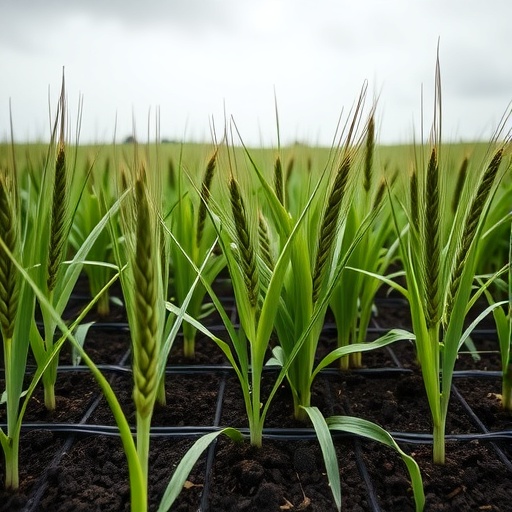As global climates shift towards greater aridity, the resilience of agricultural systems becomes increasingly uncertain. Drought stress has been identified as a formidable challenge that significantly interferes with plant growth and productivity, ultimately endangering food security worldwide. Recent research highlights how drought conditions not only affect the plants themselves but also critically alter the microbial communities associated with them. The interactions between plants and these microbes are essential, as they contribute to soil health, nutrient cycling, and overall plant vitality.
The study in question meticulously investigates the effect of drought stress on the microbiota that colonize wheat plants, emphasizing the changes that occur across various plant compartments including the phyllosphere, rhizosphere, and root endosphere. Through extensive sampling and analysis, researchers uncovered a notable shift in the composition of these microbiomes, favoring specific groups of microorganisms such as Actinobacteria and Ascomycota. On the other hand, the presence of groups like Proteobacteria and Basidiomycota was significantly diminished under drought conditions.
The ability of certain bacterial taxa to thrive in drought-impacted environments marks a pivotal point for future agricultural practices. By utilizing advanced techniques such as targeted single-cell sorting and sequencing, the researchers identified a collection of 21 drought-tolerant bacteria (DTB) that were not only enriched in drought conditions but also appeared to be laden with genes associated with nutrient cycling and enhanced plant fitness. These findings suggest that these DTBs possess adaptive features that allow them to survive and function effectively in the face of drought.
In a particularly striking finding, the study revealed that these drought-tolerant bacteria exhibited strong positive correlations with specific plant-derived metabolites, such as jasmonic acid and pipecolic acid. These metabolites are known to play critical roles in plant stress responses, revealing a sophisticated level of interaction between plants and their associated microbiomes. The presence of drought-enriched phytochemicals may influence which microbes flourish in a given environment, thereby reshaping the microbial landscape around the plant.
To further delve into the potential benefits of these identified DTBs, the researchers conducted inoculation experiments using a synthetic community composed of four specific drought-tolerant taxa. The results were promising, demonstrating a significant enhancement in wheat growth even under challenging drought conditions. This experiment provides a viable strategy for utilizing beneficial microbes to bolster plant resilience in adverse environmental conditions.
Widespread detection of these drought-tolerant bacteria across different geographic locations further supports their potential utility. This indicates a broader ecological presence of such microbes, raising the exciting prospect that agriculture could leverage these communities to improve crop resilience on a global scale. Ensuring food security in an era of unpredictable climate is more pressing than ever, and the insights gained from this study could provide key solutions.
Zealous interest in microbial communities associated with plants is not new, but this research takes the field a step further by linking specific microbial taxa to drought resilience directly. By understanding the functional roles that these microbes play, researchers can begin to formulate microbiome management strategies that might promote beneficial interactions within plant systems.
Fundamentally, this work reshapes our understanding of how agricultural ecosystems can be designed to be more efficient and sustainable. The implications of enhancing microbiome functions cannot be understated; by enriching plant systems with supportive microbial communities, similar approaches could be employed across various crops, accentuating their ability to withstand climate-related stresses.
The techniques developed in this study could also serve as the groundwork for future research, potentially leading to the discovery of more microbial taxa that can support plant health under stress. The process of identifying and characterizing these organisms not only fuels academic inquiry but also directly impacts the agricultural landscape by proposing novel methods for soil and crop management.
Furthermore, integrating the insights gleaned from microbial studies can translate into practical applications. Raising awareness among farmers and agricultural practitioners about the importance of microbial health could lead to new practices that enhance soil biodiversity and promote a healthier plant microbiome. Such measures not only contribute to higher crop yields but also strengthen soil resilience against the ever-growing threat of drought.
It is clear that the relationship between drought and microbial communities is complex, with numerous variables influencing outcomes. Future efforts should thus emphasize large-scale research to create a more comprehensive understanding of how these interactions play out under varying climatic conditions and across different agricultural systems.
The potential to utilize nature’s own mechanisms for enhancing food production amid adverse conditions lies within our grasp. This research not only paves the way for increased crop yields and food security but also sets the stage for sustainable agricultural practices that will benefit generations to come. Through embracing and harnessing microbial diversity, we may find innovative solutions to some of the most pressing challenges facing humanity today.
In summary, the exploration of drought-tolerant bacteria in the wheat rhizosphere reveals significant microbiota shifts that hold the key to enhancing plant resilience. By tapping into the intricate web of life that exists within the soil, we can cultivate a future where crops flourish even in the face of climate change, ensuring food security in a challenging environmental landscape. As we harness these insights, the agricultural sector can transition towards more sustainable practices that align with ecological principles, yielding not only productivity gains but a more resilient planet.
Subject of Research: Drought-tolerant bacteria and their role in enhancing plant resilience in response to drought stress.
Article Title: Global exploration of drought-tolerant bacteria in the wheat rhizosphere reveals microbiota shifts and functional taxa enhancing plant resilience.
Article References:
Xiang, Q., Yang, K., Cui, L. et al. Global exploration of drought-tolerant bacteria in the wheat rhizosphere reveals microbiota shifts and functional taxa enhancing plant resilience. Nat Food (2025). https://doi.org/10.1038/s43016-025-01248-2
Image Credits: AI Generated
DOI: 10.1038/s43016-025-01248-2
Keywords: drought stress, plant resilience, microbiome, wheat, Actinobacteria, Ascomycota, drought-tolerant bacteria, nutrient cycling, phytochemicals.
Tags: Actinobacteria and Ascomycota dominanceagricultural practices under climate changedrought stress impactdrought-resistant bacteriafood security and drought challengesmicrobial communities in agriculturephyllosphere and root endosphereProteobacteria and Basidiomycota declinerhizosphere microbiomesoil health and nutrient cyclingtargeted sequencing techniques in microbiologywheat plant resilience





